Fleurs du Mal Magazine


Or see the index
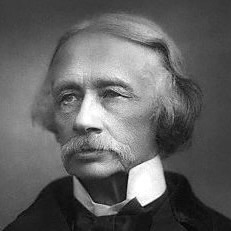
The Revelation
An idle poet, here and there,
Looks round him; but, for all the rest,
The world, unfathomably fair,
Is duller than a witling’s jest.
Love wakes men, once a lifetime each;
They lift their heavy lids, and look;
And, lo, what one sweet page can teach,
They read with joy, then shut the book.
And some give thanks, and some blaspheme
And most forget; but, either way,
That and the Child’s unheeded dream
Is all the light of all their day.
Coventry Patmore
1823–1896
The Revelation
• fleursdumal.nl magazine
More in: # Classic Poetry Archive, Archive O-P, Archive O-P
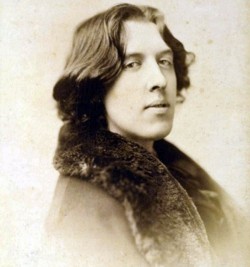
The Garden of Eros
IT is full summer now, the heart of June,
Not yet the sun-burnt reapers are a-stir
Upon the upland meadow where too soon
Rich autumn time, the season’s usurer,
Will lend his hoarded gold to all the trees,
And see his treasure scattered by the wild and spendthrift breeze.
Too soon indeed! yet here the daffodil,
That love-child of the Spring, has lingered on
To vex the rose with jealousy, and still
The harebell spreads her azure pavilion,
And like a strayed and wandering reveller
Abandoned of its brothers, whom long since June’s messenger
The missel-thrush has frighted from the glade,
One pale narcissus loiters fearfully
Close to a shadowy nook, where half afraid
Of their own loveliness some violets lie
That will not look the gold sun in the face
For fear of too much splendour,—ah! methinks it is a place
Which should be trodden by Persephone
When wearied of the flowerless fields of Dis!
Or danced on by the lads of Arcady!
The hidden secret of eternal bliss
Known to the Grecian here a man might find,
Ah! you and I may find it now if Love and Sleep be kind.
There are the flowers which mourning Herakles
Strewed on the tomb of Hylas, columbine,
Its white doves all a-flutter where the breeze
Kissed them too harshly, the small celandine,
That yellow-kirtled chorister of eve,
And lilac lady’s-smock,—but let them bloom alone, and leave
Yon spired holly-hock red-crocketed
To sway its silent chimes, else must the bee,
Its little bellringer, go seek instead
Some other pleasaunce; the anemone
That weeps at daybreak, like a silly girl
Before her love, and hardly lets the butterflies unfurl
Their painted wings beside it,—bid it pine
In pale virginity; the winter snow
Will suit it better than those lips of thine
Whose fires would but scorch it, rather go
And pluck that amorous flower which blooms alone,
Fed by the pander wind with dust of kisses not its own.
The trumpet-mouths of red convolvulus
So dear to maidens, creamy meadow-sweet
Whiter than Juno’s throat and odorous
As all Arabia, hyacinths the feet
Of Huntress Dian would be loth to mar
For any dappled fawn,—pluck these, and those fond flowers which are
Fairer than what Queen Venus trod upon
Beneath the pines of Ida, eucharis,
That morning star which does not dread the sun,
And budding marjoram which but to kiss
Would sweeten Cytheræa’s lips and make
Adonis jealous,—these for thy head,—and for thy girdle take
Yon curving spray of purple clematis
Whose gorgeous dye outflames the Tyrian King,
And fox-gloves with their nodding chalices,
But that one narciss which the startled Spring
Let from her kirtle fall when first she heard
In her own woods the wild tempestuous song of summer’s bird,
Ah! leave it for a subtle memory
Of those sweet tremulous days of rain and sun,
When April laughed between her tears to see
The early primrose with shy footsteps run
From the gnarled oak-tree roots till all the wold,
Spite of its brown and trampled leaves, grew bright with shimmering gold.
Nay, pluck it too, it is not half so sweet
As thou thyself, my soul’s idolatry!
And when thou art a-wearied at thy feet
Shall oxlips weave their brightest tapestry,
For thee the woodbine shall forget its pride
And vail its tangled whorls, and thou shalt walk on daisies pied.
And I will cut a reed by yonder spring
And make the wood-gods jealous, and old Pan
Wonder what young intruder dares to sing
In these still haunts, where never foot of man
Should tread at evening, lest he chance to spy
The marble limbs of Artemis and all her company.
And I will tell thee why the jacinth wears
Such dread embroidery of dolorous moan,
And why the hapless nightingale forbears
To sing her song at noon, but weeps alone
When the fleet swallow sleeps, and rich men feast,
And why the laurel trembles when she sees the lightening east.
And I will sing how sad Proserpina
Unto a grave and gloomy Lord was wed,
And lure the silver-breasted Helena
Back from the lotus meadows of the dead,
So shalt thou see that awful loveliness
For which two mighty Hosts met fearfuly in war’s abyss!
And then I ’ll pipe to thee that Grecian tale
How Cynthia loves the lad Endymion,
And hidden in a grey and misty veil
Hies to the cliffs of Latmos once the Sun
Leaps from his ocean bed in fruitless chase
Of those pale flying feet which fade away in his embrace.
And if my flute can breathe sweet melody,
We may behold Her face who long ago
Dwelt among men by the Ægean sea,
And whose sad house with pillaged portico
And friezeless wall and columns toppled down
Looms o’er the ruins of that fair and violet-cinctured town.
Spirit of Beauty! tarry still a-while,
They are not dead, thine ancient votaries,
Some few there are to whom thy radiant smile
Is better than a thousand victories,
Though all the nobly slain of Waterloo
Rise up in wrath against them! tarry still, there are a few.
Who for thy sake would give their manlihood
And consecrate their being, I at least
Have done so, made thy lips my daily food,
And in thy temples found a goodlier feast
Than this starved age can give me, spite of all
Its new-found creeds so sceptical and so dogmatical.
Here not Cephissos, not Ilissos flows,
The woods of white Colonos are not here,
On our bleak hills the olive never blows,
No simple priest conducts his lowing steer
Up the steep marble way, nor through the town
Do laughing maidens bear to thee the crocus-flowered gown.
Yet tarry! for the boy who loved thee best,
Whose very name should be a memory
To make thee linger, sleeps in silent rest
Beneath the Roman walls, and melody
Still mourns her sweetest lyre, none can play
The lute of Adonais, with his lips Song passed away.
Nay, when Keats died the Muses still had left
One silver voice to sing his threnody,
But ah! too soon of it we were bereft
When on that riven night and stormy sea
Panthea claimed her singer as her own,
And slew the mouth that praised her; since which time we walk alone,
Save for that fiery heart, that morning star
Of re-arisen England, whose clear eye
Saw from our tottering throne and waste of war
The grand Greek limbs of young Democracy
Rise mightily like Hesperus and bring
The great Republic! him at least thy love hath taught to sing,
And he hath been with thee at Thessaly,
And seen white Atalanta fleet of foot
In passionless and fierce virginity
Hunting the tuskéd boar, his honied lute
Hath pierced the cavern of the hollow hill,
And Venus laughs to know one knee will bow before her still.
And he hath kissed the lips of Proserpine,
And sung the Galilæan’s requiem,
That wounded forehead dashed with blood and wine
He hath discrowned, the Ancient Gods in him
Have found their last, most ardent worshipper,
And the new Sign grows grey and dim before its conqueror.
Spirit of Beauty! tarry with us still,
It is not quenched the torch of poesy,
The star that shook above the Eastern hill
Holds unassailed its argent armoury
From all the gathering gloom and fretful fight—
O tarry with us still! for through the long and common night,
Morris, our sweet and simple Chaucer’s child,
Dear heritor of Spenser’s tuneful reed,
With soft and sylvan pipe has oft beguiled
The weary soul of man in troublous need,
And from the far and flowerless fields of ice
Has brought fair flowers meet to make an earthly paradise.
We know them all, Gudrun the strong men’s bride,
Aslaug and Olafson we know them all,
How giant Grettir fought and Sigurd died,
And what enchantment held the king in thrall
When lonely Brynhild wrestled with the powers
That war against all passion, ah! how oft through summer hours,
Long listless summer hours when the noon
Being enamoured of a damask rose
Forgets to journey westward, till the moon
The pale usurper of its tribute grows
From a thin sickle to a silver shield
And chides its loitering car—how oft, in some cool grassy field
Far from the cricket-ground and noisy eight,
At Bagley, where the rustling bluebells come
Almost before the blackbird finds a mate
And overstay the swallow, and the hum
Of many murmuring bees flits through the leaves,
Have I lain poring on the dreamy tales his fancy weaves,
And through their unreal woes and mimic pain
Wept for myself, and so was purified,
And in their simple mirth grew glad again;
For as I sailed upon that pictured tide
The strength and splendour of the storm was mine
Without the storm’s red ruin, for the singer is divine,
The little laugh of water falling down
Is not so musical, the clammy gold
Close hoarded in the tiny waxen town
Has less of sweetness in it, and the old
Half-withered reeds that waved in Arcady
Touched by his lips break forth again to fresher harmony.
Spirit of Beauty tarry yet a-while!
Although the cheating merchants of the mart
With iron roads profane our lovely isle,
And break on whirling wheels the limbs of Art,
Ay! though the crowded factories beget
The blind-worm Ignorance that slays the soul, O tarry yet!
For One at least there is,—He bears his name
From Dante and the seraph Gabriel,—
Whose double laurels burn with deathless flame
To light thine altar; He too loves thee well,
Who saw old Merlin lured in Vivien’s snare,
And the white feet of angels coming down the golden stair,
Loves thee so well, that all the World for him
A gorgeous-coloured vestiture must wear,
And Sorrow take a purple diadem,
Or else be no more Sorrow, and Despair
Gild its own thorns, and Pain, like Adon, be
Even in anguish beautiful;—such is the empery
Which Painters hold, and such the heritage
This gentle solemn Spirit doth possess,
Being a better mirror of his age
In all his pity, love, and weariness,
Than those who can but copy common things,
And leave the Soul unpainted with its mighty questionings.
But they are few, and all romance has flown,
And men can prophesy about the sun,
And lecture on his arrows—how, alone,
Through a waste void the soulless atoms run,
How from each tree its weeping nymph has fled,
And that no more ’mid English reeds a Naïad shows her head.
Methinks these new Actæons boast too soon
That they have spied on beauty; what if we
Have analyzed the rainbow, robbed the moon
Of her most ancient, chastest mystery,
Shall I, the last Endymion, lose all hope
Because rude eyes peer at my mistress through a telescope!
What profit if this scientific age
Burst through our gates with all its retinue
Of modern miracles! Can it assuage
One lover’s breaking heart? what can it do
To make one life more beautiful, one day
More god-like in its period? but now the Age of Clay
Returns in horrid cycle, and the earth
Hath borne again a noisy progeny
Of ignorant Titans, whose ungodly birth
Hurls them against the august hierarchy
Which sat upon Olympus, to the Dust
They have appealed, and to that barren arbiter they must
Repair for judgment, let them, if they can,
From Natural Warfare and insensate Chance,
Create the new Ideal rule for man!
Methinks that was not my inheritance;
For I was nurtured otherwise, my soul
Passes from higher heights of life to a more supreme goal.
Lo! while we spake the earth did turn away
Her visage from the God, and Hecate’s boat
Rose silver-laden, till the jealous day
Blew all its torches out: I did not note
The waning hours, to young Endymions
Time’s palsied fingers count in vain his rosary of suns!—
Mark how the yellow iris wearily
Leans back its throat, as though it would be kissed
By its false chamberer, the dragon-fly,
Who, like a blue vein on a girl’s white wrist,
Sleeps on that snowy primrose of the night,
Which ’gins to flush with crimson shame, and die beneath the light.
Come let us go, against the pallid shield
Of the wan sky the almond blossoms gleam,
The corn-crake nested in the unmown field
Answers its mate, across the misty stream
On fitful wing the startled curlews fly,
And in his sedgy bed the lark, for joy that Day is nigh,
Scatters the pearléd dew from off the grass,
In tremulous ecstasy to greet the sun,
Who soon in gilded panoply will pass
Forth from yon orange-curtained pavilion
Hung in the burning east, see, the red rim
O’ertops the expectant hills! it is the God! for love of him
Already the shrill lark is out of sight,
Flooding with waves of song this silent dell,—
Ah! there is something more in that bird’s flight
Than could be tested in a crucible!—
But the air freshens, let us go,—why soon
The woodmen will be here; how we have lived this night of June!
Oscar Wilde
(1854 – 1900)
The Garden of Eros
• fleursdumal.nl magazine
More in: Archive W-X, Archive W-X, Wilde, Oscar, Wilde, Oscar
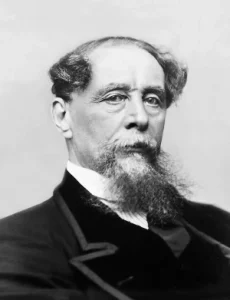
The Song of the Wreck
The wind blew high, the waters raved,
A ship drove on the land,
A hundred human creatures saved
Kneel’d down upon the sand.
Three-score were drown’d, three-score were thrown
Upon the black rocks wild,
And thus among them, left alone,
They found one helpless child.
A seaman rough, to shipwreck bred,
Stood out from all the rest,
And gently laid the lonely head
Upon his honest breast.
And travelling o’er the desert wide
It was a solemn joy,
To see them, ever side by side,
The sailor and the boy.
In famine, sickness, hunger, thirst,
The two were still but one,
Until the strong man droop’d the first
And felt his labours done.
Then to a trusty friend he spake,
“Across the desert wide,
O take this poor boy for my sake!”
And kiss’d the child and died.
Toiling along in weary plight
Through heavy jungle, mire,
These two came later every night
To warm them at the fire.
Until the captain said one day,
“O seaman good and kind,
To save thyself now come away,
And leave the boy behind!”
The child was slumbering near the blaze:
“O captain, let him rest
Until it sinks, when God’s own ways
Shall teach us what is best!”
They watch’d the whiten’d ashy heap,
They touch’d the child in vain;
They did not leave him there asleep,
He never woke again.
Charles Dickens
(1812-1870)
The Song of the Wreck
• fleursdumal.nl magazine
More in: Archive C-D, Archive C-D, Charles Dickens, Dickens, Charles
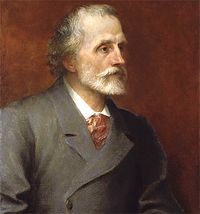
Modern Love: XXIX
Am I failing? For no longer can I cast
A glory round about this head of gold.
Glory she wears, but springing from the mould;
Not like the consecration of the Past!
Is my soul beggared? Something more than earth
I cry for still: I cannot be at peace
In having Love upon a mortal lease.
I cannot take the woman at her worth!
Where is the ancient wealth wherewith I clothed
Our human nakedness, and could endow
With spiritual splendour a white brow
That else had grinned at me the fact I loathed?
A kiss is but a kiss now! and no wave
Of a great flood that whirls me to the sea.
But, as you will! we’ll sit contentedly,
And eat our pot of honey on the grave.
George Meredith
(1828-1909)
Modern Love: XXIX
• fleursdumal.nl magazine
More in: # Classic Poetry Archive, Archive M-N, Archive M-N
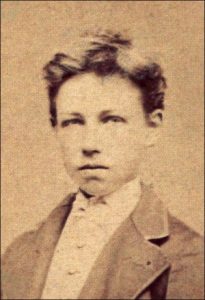
Départ
Assez vu. La vision s’est rencontrée à tous les airs.
Assez eu. Rumeurs des villes, le soir, et au soleil, et toujours.
Assez connu. Les arrêts de la vie. – Ô Rumeurs et Visions !
Départ dans l’affection et le bruit neufs !
Arthur Rimbaud
(1854 – 1891)
Départ
Illuminations
• fleursdumal.nl magazine
More in: #Editors Choice Archiv, Archive Q-R, Archive Q-R, Arthur Rimbaud, Rimbaud, Arthur, Rimbaud, Arthur

The Toys
My little Son, who look’d from thoughtful eyes
And moved and spoke in quiet grown-up wise,
Having my law the seventh time disobey’d,
I struck him, and dismiss’d
With hard words and unkiss’d,
His Mother, who was patient, being dead.
Then, fearing lest his grief should hinder sleep,
I visited his bed,
But found him slumbering deep,
With darken’d eyelids, and their lashes yet
From his late sobbing wet.
And I, with moan,
Kissing away his tears, left others of my own;
For, on a table drawn beside his head,
He had put, within his reach,
A box of counters and a red-vein’d stone,
A piece of glass abraded by the beach
And six or seven shells,
A bottle with bluebells
And two French copper coins, ranged there with careful art,
To comfort his sad heart.
So when that night I pray’d
To God, I wept, and said:
Ah, when at last we lie with tranced breath,
Not vexing Thee in death,
And Thou rememberest of what toys
We made our joys,
How weakly understood
Thy great commanded good,
Then, fatherly not less
Than I whom Thou hast moulded from the clay,
Thou’lt leave Thy wrath, and say,
“I will be sorry for their childishness.”
Coventry Patmore
(1823–1896)
The Toys
• fleursdumal.nl magazine
More in: # Classic Poetry Archive, Archive O-P, Archive O-P, Children's Poetry

‘Keen, fitful gusts…’
Keen, fitful gusts are whisp’ring here and there
Among the bushes half leafless, and dry;
The stars look very cold about the sky,
And I have many miles on foot to fare.
Yet feel I little of the cool bleak air,
Or of the dead leaves rustling drearily,
Or of those silver lamps that burn on high,
Or of the distance from home’s pleasant lair:
For I am brimful of the friendliness
That in a little cottage I have found;
Of fair-hair’d Milton’s eloquent distress,
And all his love for gentle Lycid drown’d;
Of lovely Laura in her light green dress,
And faithful Petrarch gloriously crowned.
John Keats
(1795 – 1821)
‘Keen, fitful gusts…’
• fleursdumal.nl magazine
More in: Archive K-L, Archive K-L, John Keats, Keats, John
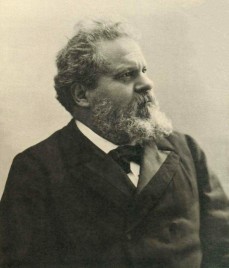
Dante
Strong forms were those of the New Life, that stood
Around thy cradle,
O Master of the song that looks above!
A brave young giantess,
Unknown before to Greek or Latin shores,
Daring in love and hate, and fair withal,
Came Tuscan Libertade, and the child
Already with bounteous breast did comfort thee.
And all a-glowing with her spheral rays,
Mild and austere in one,
Came Faith: and she, across a shore
Obscure with crowds of visions and of shades,
Opened for thee the Gate of the Infinite.
Sighing and pensive, yet with locks aglow
With rosy splendour from another air,
Love made long stay.
And such the gentle things
He talked to thee with bashful lips, so sweetly
He entered all the chambers of thy heart,
That no one ever knew to love like thee.
But soon away from lonely meditating,
O youthful recluse,
Wild clamour and fierce tumult tore thee, and
The fury of brothers seeking brothers’ blood.
Thou heard’st the hissing flames of civil war
On neighbour’s walls; thou heardest women shriek
To heaven that altars and the marriage bed,
The dear hearth-stone and the infant’s cradle,—
All that made fair the marital abode,
Were swept away in one great gulf of flame.
Their men had rushed from their embrace to arms;
The youth breathed only anger and destruction.
Thou sawest the raging of swords
Seeking the breast-plunge;
Thou heardest the dying warrior
Blaspheme and curse:
Before thee, streaming with gore,
Gold locks and grey;
And the Furies offering
To Liberty the execrated host
Of human victims;
And Death, the cruel arbiter of fates,
Crumbling the mighty towers and opening
The long-barred gates.
Amid wild scenes
So grew thy Italian soul,
And prayed that the long civil hate might end.
Meanwhile he saw
Of love such pure revealings and so strange,
The which depicted in the shade
Of a young myrtle-tree,
Each one who saw must bow the head in reverence.
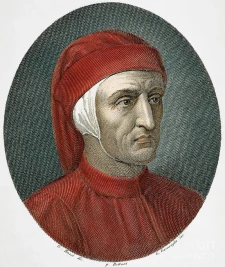
But o’er this gentle dream
There came the voice of weeping,
Bitterly sounding from the maternal source.
Alas! broken by the whirlwind,
Lies the fair myrtle,
And with wide-spread wings
The dove of sweet affection is flown forth
To seek a purer aura for its flight.
He, driven here and there
In the thick darkness of the turbulent age,
Sought refuge with the famous shades of old;
So learned to hate himself and present things.
And in the twilight came he forth a giant,
Seeming a shade himself—an angry shade
Who through the desert went from tomb to tomb,
Now questioning and now embracing them:
Until before him rose across the ruin
And dust of these barbaric ages gone,
Like a cloudy pillar, the ancient Latin valour.
Then all that such a ruin tells did burst
Upon the silent air in one great cry.
In the exalted vision
Arose the poet divine; and now, disdaining
His stricken land and time that only wasted
In petty aimless strife the ancient strength,
He, in the seeing of his heart’s desire,
Saluted thee, O modern Italy,—
One, in thy valiant arms, thy laws, thy speech.
And then, to truly tell
What such a vision meant, he sought to know
The life that rolls through all the sea of being.
From beneath the dust of buried centuries
He made things good and ill to tell their tale
Through him the fatal prophet: till his voice
Resounded through the world, and made the ages
Turn and behold themselves. Judge and lord,
He placed them where they could themselves behold,
Admired and wept, disdained and laughed at them;
Then shut them up in his eternal song,
Well pleased that he had power to do this much.
And meanwhile this poor tangle
Where the weeping and the wailing still goes on,
This endless fraud and shadow
Which has the name of life and is so base,—
All this didst thou despise! Thy sacred muse
Explored the depths of all the universe.
Following the good gentile Philosopher
Who placed thee in the midst of secret things,
Thou didst desire to see as angels see
There where there is no intervening veil;
And thou wouldst love as they do love in heaven.
Up through the ways of love
The humble creature
Pushing his way to the Creator’s presence,
Wished to find rest in that eternal Truth
Which taught thee the great love and the great thought.
Here Virgil failed thee,
And thou, deserted,
A lonely human spirit as if drowned
Within the abyss of thy immense desire,
Didst vanish overwhelmed in doubt,—
When as on wings
Angelical there came unto thy grief
She who is love and light and vision
Between the understanding and the True.
No mortal tongue like mine may give her name,
But thou who lovedst didst call her Beatrice.
And so from sphere to sphere
‘T was naught but melody that thou didst hear,
‘T was naught but one great light that thou didst see,
And every single sense thou hadst was love,
And verse and spirit made one harmony
Like unto her who there revealed herself.
Alas! what caredst thou then
For thy poor country and the endless strife
That rent its cities like, alas! even those
That make forever dark the vales of hell!
From heaven descending thou didst thrice bring down
The Hymn Supreme, and all the while there shone
Upon thy brow a radiance divine
Like his who spake with God in Sinai.
Before thee shining
In all the splendour of the holy Kingdom
Flashed in its crimson light the mortal field
Of Montaperto, and along the wastes
Deserted and malignant came the sound,
Dreary and dull, of dying warriors’ sighs:
To which far off responded
With a great cry of mingled human woe
The cursed battle-field of Campaldino.
And thou, Rea Meloria,
Didst rise from the Tuscan sea
To tell the glory of this horrid slaughter,
And of the Thyrrenian shores made desolate
With this our madness, and the sea’s great bosom
All stained with blood, and far Liguria’s strand
Filled with the moan of lonely Pisan exiles
And children born for fratricidal war.
Giosuè Carducci
(1835 – 1907)
Dante
• fleursdumal.nl magazine
More in: # Classic Poetry Archive, Archive C-D, Archive C-D, Dante Alighieri
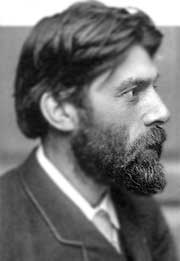
Low Barometer
The south-wind strengthens to a gale,
Across the moon the clouds fly fast,
The house is smitten as with a flail,
The chimney shudders to the blast.
On such a night, when Air has loosed
Its guardian grasp on blood and brain,
Old terrors then of god or ghost
Creep from their caves to life again;
And Reason kens he herits in
A haunted house. Tenants unknown
Assert their squalid lease of sin
With earlier title than his own.
Unbodied presences, the pack’d
Pollution and remorse of Time,
Slipp’d from oblivion reënact
The horrors of unhouseld crime.
Some men would quell the thing with prayer
Whose sightless footsteps pad the floor,
Whose fearful trespass mounts the stair
Or burts the lock’d forbidden door.
Some have seen corpses long interr’d
Escape from hallowing control,
Pale charnel forms—nay ev’n have heard
The shrilling of a troubled soul,
That wanders till the dawn hath cross’d
The dolorous dark, or Earth hath wound
Closer her storm-spredd cloke, and thrust
The baleful phantoms underground.
Robert Bridges
(1844-1930)
Low Barometer
• fleursdumal.nl magazine
More in: Archive A-B, Archive A-B, Bridges, Robert

La Chambrée de nuit
Rêve
On a faim dans la chambrée –
C’est vrai…
Émanations, explosions. Un génie :
« Je suis le gruère ! » –
Lefêbvre « Keller ! »
Le génie « Je suis le Brie ! » –
Les soldats coupent sur leur pain :
« C’est la vie ! »
Le génie. – « Je suis le Roquefort ! »
– « Ça s’ra not’ mort !… »
Je suis le gruère
Et le Brie !… etc.
Valse
On nous a joints, Lefèbvre et moi, etc.
Arthur Rimbaud
(1854 – 1891)
La Chambrée de nuit
Rêve
Derniers vers
• fleursdumal.nl magazine
More in: #Editors Choice Archiv, Archive Q-R, Archive Q-R, Arthur Rimbaud, Rimbaud, Arthur

Petrarca
If far from turbid thoughts and gloomy mood
Some smiling day should see my wish fulfilled
Where breathe the vales with gentle brooks enrilled
The soft air of my Tuscan neighbourhood,
There, where is heard no more the garrulous brood
Of thoughtless minds, in deep oblivion stilled,
Would I to thee my heart’s pure altar build
In the green blackness of the tangled wood.
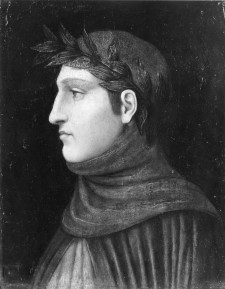
There with the dying splendours of the sun
Thy song should glow amid the flowers springing
On breezy banks where whispering streams do run;
As if, still sweeter sounds and odours flinging
Upward to heaven when the day is done,
A nightingale from bough to bough were singing.
Giosuè Carducci
(1835 – 1907)
Petrarca
• fleursdumal.nl magazine
More in: # Classic Poetry Archive, Archive C-D, Archive C-D, Archive O-P, Petrarca, Francesco

Märchen
Ich hab vor deinem Hause still gestanden
In einer Nacht.
Und hatte ganz dich lieb und ohne Maßen;
Ich wies zu dir den Sternen goldne Straßen
Und habe selig stumm gelacht.
Ob meinem losen Haar hob ich die Arme
Wie Zweige, schlank und rund.
Da stürzte Regen in das Mainachtschweigen
Und rief sich zage Blüten aus den Zweigen,
Und jede war ein blasser Mund.
Du aber kamst nicht.
So streute ich mit lächelndem Verschwenden
Dem Mond die Blumen her.
Und spürte Treiben herber, dunkler Kräfte,
Mir ward die Frucht voll süßer, süßer Säfte;
Schon fiel sie, duftend, weich und schwer.
Du aber kamst nicht.
Eishagel tanzte höhnend auf den Steinen.
Da klaffte schwarz ein Schacht.
Drein ließ ich die zerbrochnen Arme hangen. –
Geblüht und Frucht getragen – und vergangen
In einer Nacht.
Gertrud Kolmar
(1894 – 1943)
Märchen
• fleursdumal.nl magazine
More in: #Editors Choice Archiv, Archive K-L, Archive K-L, Grimm, Andersen e.o.: Fables, Fairy Tales & Stories, Holocaust, Kolmar, Gertrud
Thank you for reading Fleurs du Mal - magazine for art & literature